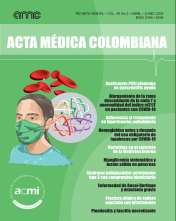The Value of Narratives in the Practice of Internal Medicine
Abstract
Narrative medicine has been consolidating for a little more than two decades as a discipline in which medical and literary elements -more specifically narrative- are combined. It is a more humane, empathetic and compassionate approach to the sufferings of those who come to the doctor's office, while at the same time it represents a transformation in the dynamics of the doctor-patient relationship, attempting to rescue fundamental elements implicit in the communicative act. Rita Charon, an American physician who has carried out important teaching and dissemination work to set the limits of the discipline, defines narrative medicine as that "practiced with the narrative competence to recognize, interpret and act in the difficult situations of others", which raises the need to train health personnel to receive the stories that patients share about their ailments, understand the meanings that have been deposited in these stories and act accordingly to help them find what they are looking for, crossed by cultural aspects intrinsic to their way of inhabiting the world. The need to create, expand and strengthen this type of courses within the curriculum of the different Internal Medicine programs in the country is proposed, based on the author's own experience during his teaching experience at the School of Medicine of the University of Antioquia.
Metrics
Copyright (c) 2024 Julián Rondón C

This work is licensed under a Creative Commons Attribution 4.0 International License.
Acta Medica Colombiana uses the CC-BY 4.0 license. Authors retain all rights over their work.


